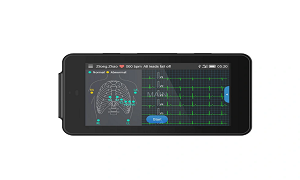What is the Difference Between ECG and EKG Machine?
-
2024-01-13
-
LEPU

In the medical field, various terms and acronyms are used to describe diagnostic tools and procedures. One such example is the Electrocardiogram (ECG) or Electrocardiograph (EKG) machine. While both terms are commonly used interchangeably, there are slight differences between an ECG and an EKG machine. In this blog, we will explore these differences and shed light on how these machines are used in diagnosing heart conditions.
Understanding ECG Machines
An ECG machine is a medical device that records the electrical activity of the heart over a specific period. It measures the electrical signals generated by the heart as it beats, providing valuable information about the heart's rhythm, rate, and overall function. This test is non-invasive and involves attaching electrodes to the skin to detect and amplify the heart's electrical signals.
ECG machines are widely used in hospitals, clinics, and cardiac care facilities. They aid healthcare professionals in diagnosing various heart conditions, including arrhythmias, myocardial infarctions, and conduction abnormalities. ECG tracings, also known as electrocardiograms, help physicians interpret the heart's electrical activity and make informed decisions regarding patient care and treatment plans.
Exploring EKG Machines
An EKG machine is essentially the same as an ECG machine but with a slight difference in terminology. The term "EKG" is derived from the German electrokardiographie, while "ECG" comes from the English electrocardiogram. While the acronyms may suggest differences, they both refer to the same diagnostic tool.
The term "EKG" gained popularity through early electrocardiography pioneers in the United States, and it continues to be commonly used in the American medical community. On the other hand, "ECG" is extensively used globally, especially in countries following British English. Despite these differences in terminology, there is no fundamental discrepancy between the two machines in terms of their functionality or purpose.
Applications and Importance
Both ECG and EKG machines play a crucial role in diagnosing and monitoring heart conditions. They help healthcare professionals identify abnormalities in the heart's electrical impulses, detect irregular rhythms, and assess the overall cardiac health of patients.
The primary application of these machines is for diagnosing heart diseases and determining the appropriate treatment course. ECG or EKG tests are often ordered for individuals experiencing chest pain, palpitations, shortness of breath, dizziness, or other symptoms indicative of a heart condition. Timely and accurate diagnosis with the help of these machines enables physicians to provide appropriate interventions, prescriptions, or referrals to specialists.
The Future of ECG/EKG Machines
As technology continues to advance, so do the capabilities of ECG/EKG machines. As a professional ECG machine supplier, our ECG machines now offer features such as wireless connectivity, portability, and enhanced data interpretation algorithms. These advancements not only make the machines more convenient for healthcare professionals but also improve patient comfort and overall diagnostic accuracy.
In addition to traditional ECG/EKG machines used within healthcare settings, there has been a rise in wearable ECG/EKG devices. These devices, such as fitness trackers or smartwatches, allow individuals to monitor their heart rhythms and receive early warning signs of potential cardiac issues. This integration of technology and healthcare has the potential to revolutionize the way we approach heart health and preventive care.
In conclusion, the terms ECG and EKG machine are often used interchangeably to describe the same medical device used for diagnosing heart conditions. While slight differences exist in their terminology based on geographical usage, their functionality and purpose remain the same. These machines continue to play a vital role in the field of cardiology and are continually evolving with emerging technologies for improved patient care and early intervention.
